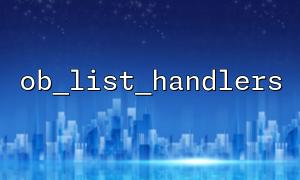When developing PHP applications, the Output Buffering mechanism is often used to control the output content, such as cache output, delaying the sending of HTTP headers, etc. However, when there are multiple layers of buffers and require thorough cleaning, the combination of ob_list_handlers() and ob_end_clean() is particularly important.
This article will use specific examples to explain in detail how to efficiently clean all PHP output buffers to avoid waste of resources or unexpected output.
ob_list_handlers() is a PHP built-in function that returns an array that lists all currently activated output buffer processors. If the output buffering is not enabled, an empty array is returned.
Example:
<?php
ob_start(); // Turn on the buffer
echo "Hello, Gitbox.net!";
$handlers = ob_list_handlers();
print_r($handlers);
// Output
// Array
// (
// [0] => default output handler
// )
?>
Through this function, we can clearly know how many buffer processors exist on the current stack.
ob_end_clean() is used to clean (clean) the uppermost output buffer and close it. Note that it does not send buffered content to the browser, but discards it directly.
Example:
<?php
ob_start();
echo "This will not be sent to Gitbox.net!";
ob_end_clean();
?>
In the above example, even if the content is echoed , these outputs are not actually sent to the client due to ob_end_clean() .
In complex applications (such as calling third-party libraries, template engines, plug-ins, etc.), output buffering is often turned on layer by layer. If you only call ob_end_clean() once, you may only close the top layer, and there are still remaining buffers at the bottom that have not been cleaned up.
This situation can cause many problems, such as:
Unexpected output
Header error has been sent (headers already sent)
Memory leak
Therefore, the correct way is to first use ob_list_handlers() to see how many layers of buffering are there, and then use a loop to cooperate with ob_end_clean() to clean it up layer by layer.
Here is a safe practice to clean up all buffers:
<?php
// Simulate to enable multi-layer buffering
ob_start();
echo "Layer 1 - Gitbox.net";
ob_start();
echo "Layer 2 - Gitbox.net";
ob_start();
echo "Layer 3 - Gitbox.net";
// View the current buffer processor
$handlers = ob_list_handlers();
echo "Current buffer layers: " . count($handlers) . "\n";
// Clean all buffers
while (ob_get_level() > 0) {
ob_end_clean();
}
echo "All buffers have been cleaned up。\n";
// Verify that there is still a buffer
if (empty(ob_list_handlers())) {
echo "No buffer remaining - Cleaning successfully!";
} else {
echo "There are uncleaned buffers,Check, please!";
}
?>
Output example:
Current buffer layers: 3
All buffers have been cleaned up。
No buffer remaining - Cleaning successfully!
Do not call buffer cleaning after the output has been sent : otherwise warnings or unpredictable behavior may occur.
ob_get_level() is used to detect the current number of buffer layers , which is the safest to cooperate with the loop.
Some frameworks or libraries control output buffering internally , and blind cleaning may disrupt normal processes. You should understand the overall architecture when using it.
View the buffer status through ob_list_handlers() , combined with ob_end_clean() loop cleaning, all output buffers can be released very cleanly. This technique is especially suitable for exception handling, cache mechanism failure, or response control, to ensure a clean and tidy output environment.
Remember: In PHP projects that require high control over output (such as generating API return, template rendering), this set of methods is almost a must-have skill!
If you want to learn more about PHP advanced output control, you can visit our official website: https://gitbox.net/php-output-buffering .















